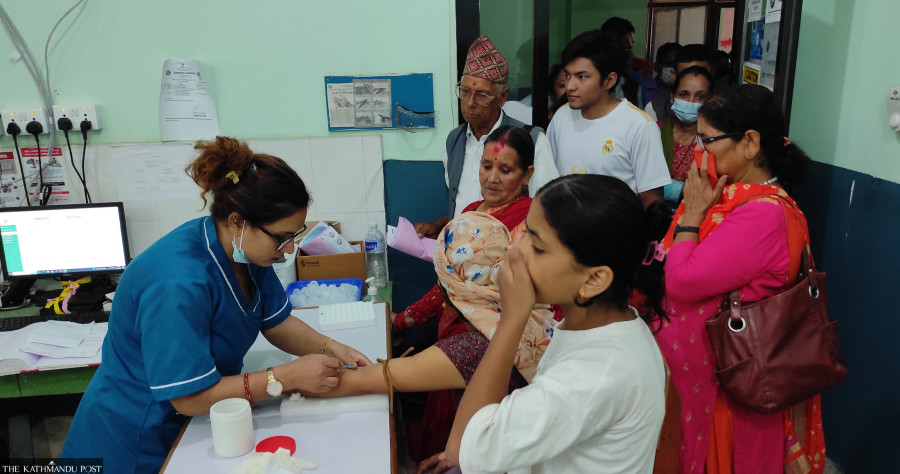Health
Dengue infection on the rise in Tanahun
A total of 2,796 people have been infected with dengue in Gandaki Province between July and September with 1,973 cases reported from Tanahun alone.
Aash Gurung
Three people died of dengue infection in the past week in Tanahun taking the dengue death toll in the district to four this fiscal year. A total of 2,796 people have been infected with dengue in Gandaki Province between the months of July and September with more than 2,100 cases reported from Tanahun alone.
Damauli in Byas Municipality, which is also the administrative headquarter of Tanahun, has become the hotspot of dengue outbreak with a total of 1,800 people infected in the municipality until Tuesday.
According to Shankarbabu Adhikari, head of the Tanahun Health Office, dengue infection is being tested in 56 labs, including 19 government and 37 private labs in the district. Most dengue patients have been going to Pokhara, Chitwan and Kathmandu for treatment for a lack of fully-equipped treatment centres in Tanahun hospitals.
According to the Tanahun Health Office, since September 19, a five-year-old boy from Bhanu Municipality-12, a 13-year-old girl from Byas-2, a 15-year-old girl from Byas-11, and a 35-year-old man from Byas-10 have died of dengue infection.
The delay in treatment is one of the reasons for the deaths, said Adhikari. According to him, dengue infection was first reported in the district on June 20 and the rate of infection has increased steadily since. “Most of the infected people are from Damauli in wards 2, 3, and 4 of Byas Municipality. Currently, around 90 percent of patients visiting health facilities have the symptoms of dengue infection,” said Adhikari. “The patients bought antibiotics for symptomatic relief and this made the infection more fatal and treatment impossible.”
“The data of the health unit of the municipality does not reflect the actual number of dengue cases in the municipality since most people are going to Pokhara, Chitwan, and Kathmandu for treatment,” said Baikuntha Neupane, mayor of Byas Municipality.
The practice of self-medication among the local population has worsened the situation in the municipality, says Neupane. “People are buying over-the-counter drugs for fever and body aches, some of the symptoms of dengue instead of seeking proper medical treatment for the infection,” he said. “This has landed dengue patients in critical medical conditions.”
The Gandaki provincial government sent a team of three doctors, including a Doctor of Medicine in General Practice (MDGP) to Damauli District Hospital after the district reported a high concentration of dengue infections.
According to the District Hospital, dengue tests are being provided free of cost to all at the hospital. As of Tuesday, the hospital has mobilised five additional health workers to provide extended services to dengue patients.
Dr Paribartan Baral, medical superintendent of the district hospital, said that an expert team of doctors from the World Health Organisation (WHO) have also arrived at the hospital to provide assistance. The district hospital, which has a capacity of 55 beds, and the GP Koirala Memorial Hospital in Shuklagandaki Municipality with the same capacity have been providing treatment to dengue patients.
“The patients with serious infections are being sent to Infectious and Communicable Disease Hospital, Pokhara and Western Regional Hospital also in Pokhara. Health workers estimate that it will take more than a month for the infections to subside,” said Baral. “People should ensure that they do not provide breeding grounds for mosquitoes. One must keep the surroundings clean and avoid storing water in open vessels.”
Dengue is a mosquito-borne disease transmitted by female Aedes aegypti and Aedes albopictus mosquitoes. The same vector also transmits chikungunya, yellow fever, and Zika, according to the World Health Organisation.
According to doctors, mild to high fever, severe muscle pain, rashes, severe headache and pain in the eyes are some symptoms of dengue. Doctors advise that those experiencing these symptoms should immediately seek treatment. While there is no specific cure for the disease, early detection and access to proper medical care can lower fatalities.
Dengue-transmitting mosquitoes breed in clean water and bite people in daylight. Uncovered water tanks and discarded plastic cups and bottles could be breeding grounds for dengue-carrying mosquitoes.
Chief District Officer Chhabilal Rijal said his office is making efforts to mobilise workers to search and destroy dengue-carrying mosquitoes from individual houses and public spaces.




 5.12°C Kathmandu
5.12°C Kathmandu.jpg)















